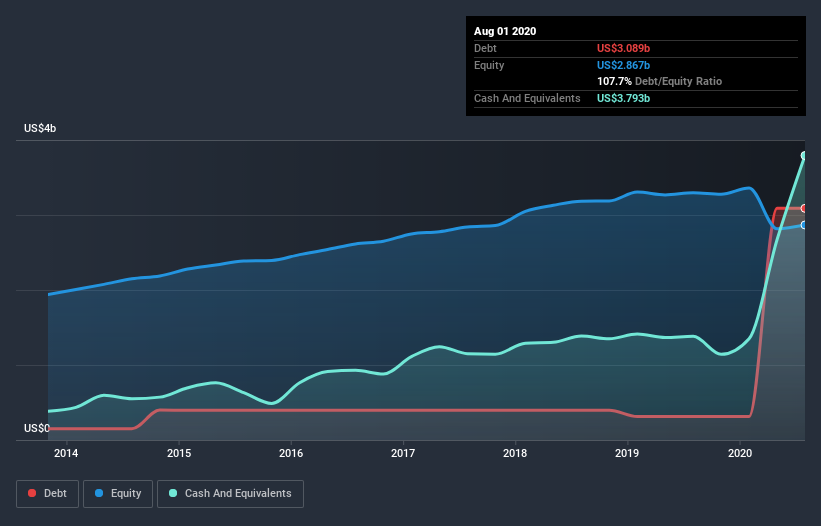Is Ross Stores (NASDAQ:ROST) Using Too Much Debt?

Howard Marks put it nicely when he said that, rather than worrying about share price volatility, 'The possibility of permanent loss is the risk I worry about... and every practical investor I know worries about.' So it might be obvious that you need to consider debt, when you think about how risky any given stock is, because too much debt can sink a company. We can see that Ross Stores, Inc. (NASDAQ:ROST) does use debt in its business. But the more important question is: how much risk is that debt creating?
What Risk Does Debt Bring?
Debt is a tool to help businesses grow, but if a business is incapable of paying off its lenders, then it exists at their mercy. Ultimately, if the company can't fulfill its legal obligations to repay debt, shareholders could walk away with nothing. While that is not too common, we often do see indebted companies permanently diluting shareholders because lenders force them to raise capital at a distressed price. Of course, debt can be an important tool in businesses, particularly capital heavy businesses. The first step when considering a company's debt levels is to consider its cash and debt together.
View our latest analysis for Ross Stores
What Is Ross Stores's Net Debt?
You can click the graphic below for the historical numbers, but it shows that as of August 2020 Ross Stores had US$3.09b of debt, an increase on US$312.7m, over one year. But on the other hand it also has US$3.79b in cash, leading to a US$704.2m net cash position.
A Look At Ross Stores's Liabilities
The latest balance sheet data shows that Ross Stores had liabilities of US$3.15b due within a year, and liabilities of US$5.30b falling due after that. Offsetting these obligations, it had cash of US$3.79b as well as receivables valued at US$162.7m due within 12 months. So it has liabilities totalling US$4.50b more than its cash and near-term receivables, combined.
Given Ross Stores has a humongous market capitalization of US$31.0b, it's hard to believe these liabilities pose much threat. However, we do think it is worth keeping an eye on its balance sheet strength, as it may change over time. Despite its noteworthy liabilities, Ross Stores boasts net cash, so it's fair to say it does not have a heavy debt load!
In fact Ross Stores's saving grace is its low debt levels, because its EBIT has tanked 67% in the last twelve months. When a company sees its earnings tank, it can sometimes find its relationships with its lenders turn sour. There's no doubt that we learn most about debt from the balance sheet. But ultimately the future profitability of the business will decide if Ross Stores can strengthen its balance sheet over time. So if you want to see what the professionals think, you might find this free report on analyst profit forecasts to be interesting.
But our final consideration is also important, because a company cannot pay debt with paper profits; it needs cold hard cash. While Ross Stores has net cash on its balance sheet, it's still worth taking a look at its ability to convert earnings before interest and tax (EBIT) to free cash flow, to help us understand how quickly it is building (or eroding) that cash balance. During the last three years, Ross Stores produced sturdy free cash flow equating to 80% of its EBIT, about what we'd expect. This free cash flow puts the company in a good position to pay down debt, when appropriate.
Summing up
While Ross Stores does have more liabilities than liquid assets, it also has net cash of US$704.2m. The cherry on top was that in converted 80% of that EBIT to free cash flow, bringing in US$705m. So we are not troubled with Ross Stores's debt use. There's no doubt that we learn most about debt from the balance sheet. But ultimately, every company can contain risks that exist outside of the balance sheet. Consider for instance, the ever-present spectre of investment risk. We've identified 2 warning signs with Ross Stores , and understanding them should be part of your investment process.
If you're interested in investing in businesses that can grow profits without the burden of debt, then check out this free list of growing businesses that have net cash on the balance sheet.
This article by Simply Wall St is general in nature. It does not constitute a recommendation to buy or sell any stock, and does not take account of your objectives, or your financial situation. We aim to bring you long-term focused analysis driven by fundamental data. Note that our analysis may not factor in the latest price-sensitive company announcements or qualitative material. Simply Wall St has no position in any stocks mentioned.
Have feedback on this article? Concerned about the content? Get in touch with us directly. Alternatively, email editorial-team@simplywallst.com.



